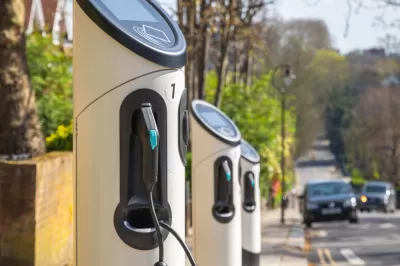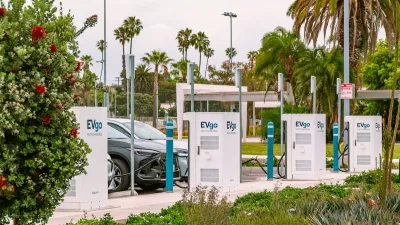A key approval from the Federal Highway Administration unlocks funding for electric vehicle charging stations and infrastructure in all states and territories.

A nationwide electric vehicle charging network is one step closer to becoming a reality after the Federal Highway Administration approved plans to unlock federal funding for all states and territories in an effort to eliminate ‘range anxiety’ and encourage faster adoption of electric vehicles.
As reported by Danielle McLean in Smart Cities Dive, “The National Electric Vehicle Infrastructure formula program created through the bipartisan infrastructure law last year provides $5 billion to states over five years to build EV charging stations every 50 miles along the federal highway system.” The recent go-ahead unlocks $1.5 million in new funds.
“Some states in their plans raised concerns about the charging station rollout, saying their power grid may not have the capacity to accommodate the growing demand for EVs now or in the future.” Under the program, states also have to cover 20 percent of build-out costs. Supporters of electrification argue that fears of grid overloads due to electric vehicles are unfounded. As Samantha Houston wrote earlier this month in a rebuttal to what she termed the fossil fuel disinformation machine,’ “there is currently enough power generation and transmission currently to serve the increase in charging load from EV purchases in the next few years, particularly if they are charged at times when other demands for power are less (such as overnight) or at times of high renewable energy generation.”
FULL STORY: EV charging network plans approved for all 50 states

Alabama: Trump Terminates Settlements for Black Communities Harmed By Raw Sewage
Trump deemed the landmark civil rights agreement “illegal DEI and environmental justice policy.”

Planetizen Federal Action Tracker
A weekly monitor of how Trump’s orders and actions are impacting planners and planning in America.

Why Should We Subsidize Public Transportation?
Many public transit agencies face financial stress due to rising costs, declining fare revenue, and declining subsidies. Transit advocates must provide a strong business case for increasing public transit funding.

Understanding Road Diets
An explainer from Momentum highlights the advantages of reducing vehicle lanes in favor of more bike, transit, and pedestrian infrastructure.

New California Law Regulates Warehouse Pollution
A new law tightens building and emissions regulations for large distribution warehouses to mitigate air pollution and traffic in surrounding communities.

Phoenix Announces Opening Date for Light Rail Extension
The South Central extension will connect South Phoenix to downtown and other major hubs starting on June 7.
Urban Design for Planners 1: Software Tools
This six-course series explores essential urban design concepts using open source software and equips planners with the tools they need to participate fully in the urban design process.
Planning for Universal Design
Learn the tools for implementing Universal Design in planning regulations.
Caltrans
Smith Gee Studio
Institute for Housing and Urban Development Studies (IHS)
City of Grandview
Harvard GSD Executive Education
Toledo-Lucas County Plan Commissions
Salt Lake City
NYU Wagner Graduate School of Public Service





























